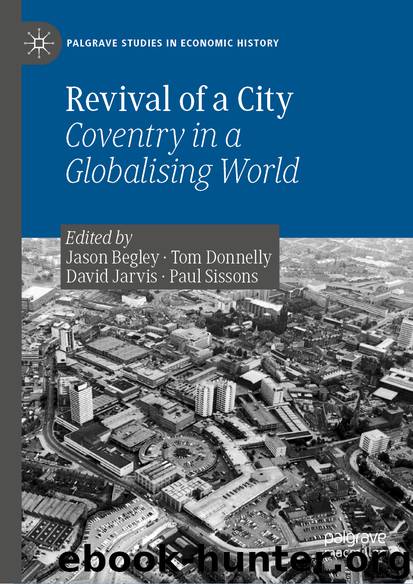Revival of a City by Unknown

Author:Unknown
Language: eng
Format: epub
ISBN: 9783030228224
Publisher: Springer International Publishing
Feeling the City
As a non-Coventrian and semi-regular visitor to the city during the course of my Ph.D., Coventry’s architecture always prompted reflection. A product of the blitz and the motor industry, with medieval survivors and the modernist visions side-by-side, one really couldn’t be anywhere else. Such a mix of architecture, together with the reasons behind it, lends Coventry a unique atmosphere.
To explore if and how such an atmosphere is manifest among Coventry’s citizens and the impact it may have had upon the city’s regeneration, it is useful invoke the notion of ‘affects’, originally posited in the seventeenth century by Baruch de Spinoza in his posthumously-published book ‘Ethics’ (1996 [1677]), and subsequent academic interpretations thereon, in an attempt to explore contemporary atmospheres that may have impacted such feelings.
Metaphysically, Spinoza says that God is Nature, something that is purely in and of itself. This ‘Nature’ is something of which we are possessed; it is an essence that is innate and authentic to us, that is ‘us’, and from which affect stems. Therefore, our ‘Nature’ determines how external ‘causes’—that is, encounters with other people or objects or things—‘affect’ us , thus resulting in an increase in happiness, what Spinoza called a ‘greater perfection’, or in sadness, leading to ‘lesser perfection’. As such, affect may be defined as the “ability to affect or be affected”, with affection as “each state of this affect between the affected and affecting bodies” (Deleuze et al. 2004, p. vxii). Such affection is associated with an innate ‘flow’ between affecting and affected bodies (Stewart 2007) that is wrought by encounter, and borne of knowledges and Nature which, because affect is “synesthetic, implying a participation of the senses in each other … [an] … ability to transform the effects of one sensory mode into another” (Massumi 2002, p. 35), results in intangible feelings; in everyday, ordinary intimacies, that are nonetheless real.
Affect can also be said to be possessed of four components. Firstly, it is “a set of embodied practices that produce visible conduct as an outer lining” (Thrift 2004, p. 60), with our actions manifest as an “expressive/aesthetic feeling-cum-behaviour of continual becoming” (ibid.), in which any context will inevitably influence how we act. Secondly, it is the Id and the Unconscious contriving an “affect in process” (ibid., pp. 60, 61) resulting in a psychological ‘drive’, something that ties in with Spinoza’s observation of our ‘essence’, or our true meaning or self. Thirdly, echoing Stewart (2007), it is “the property of the active outcome of an encounter” (Thrift 2004, p. 61), manifest as mind and body acting together thereon. Lastly, it is Darwinian, not only in that emotion evolves from affect “as a means of preparing an organism for action” (ibid., p. 63), but also in that while some basic emotions are common to all cultures, how they are communicated is necessarily influenced socially in different ways.
Anderson describes affective atmospheres as subjectivities that are at once non-cognitive and pre-cognitive, that transcend “human and non-human materialities” (2009, p. 78), making them “the
Download
This site does not store any files on its server. We only index and link to content provided by other sites. Please contact the content providers to delete copyright contents if any and email us, we'll remove relevant links or contents immediately.
Kathy Andrews Collection by Kathy Andrews(11819)
The remains of the day by Kazuo Ishiguro(8990)
Spare by Prince Harry The Duke of Sussex(5188)
Paper Towns by Green John(5186)
The Body: A Guide for Occupants by Bill Bryson(5089)
Industrial Automation from Scratch: A hands-on guide to using sensors, actuators, PLCs, HMIs, and SCADA to automate industrial processes by Olushola Akande(5058)
Machine Learning at Scale with H2O by Gregory Keys | David Whiting(4307)
Be in a Treehouse by Pete Nelson(4047)
Never by Ken Follett(3945)
Harry Potter and the Goblet Of Fire by J.K. Rowling(3851)
Goodbye Paradise(3804)
The Remains of the Day by Kazuo Ishiguro(3402)
Into Thin Air by Jon Krakauer(3391)
Fairy Tale by Stephen King(3379)
The Cellar by Natasha Preston(3340)
The Genius of Japanese Carpentry by Azby Brown(3300)
120 Days of Sodom by Marquis de Sade(3270)
Reminders of Him: A Novel by Colleen Hoover(3103)
Drawing Shortcuts: Developing Quick Drawing Skills Using Today's Technology by Leggitt Jim(3079)
